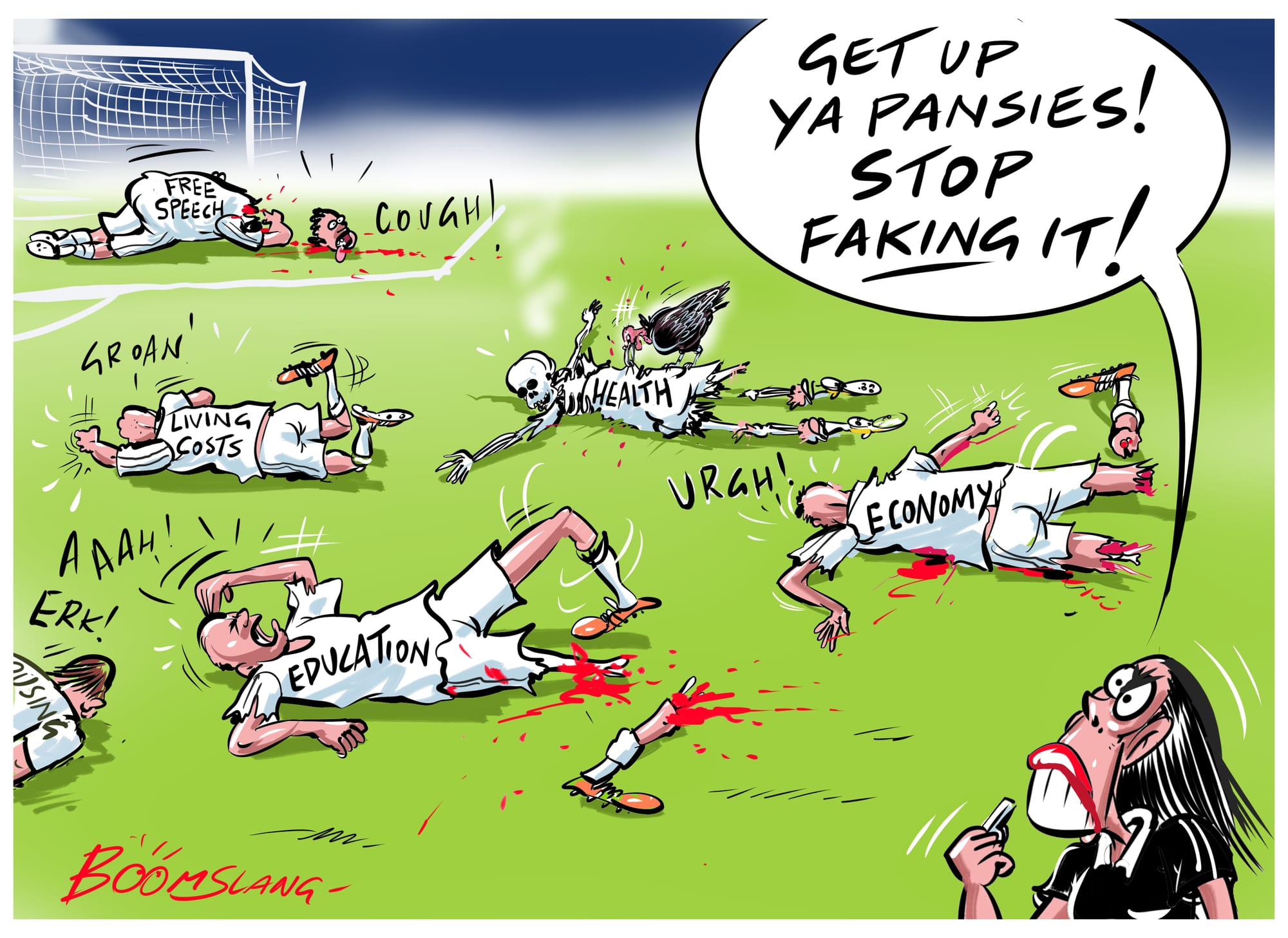Table of Contents
Imagine free speech as a label on one end of a horizontal line on a page and at the other end is censorship. X is where the two extremes meet somewhere in the middle. X marks the spot on the line where free speech ends and censorship begins: a moving target specific to the subject being discussed or acted on.
A recent example is the Hamas violence against Israel. Sky News aired a clip of an Australian woman supporting Palestine shouting into the microphone, “We support Palestine, we support Palestinians and we support Hamas.” She was exercising her right to free speech by stating her beliefs – misguided, and with the likelihood of very little Australian support for Hamas’s massacre of around 1,000 Israeli civilians. Good on Sky News for airing such a polarising segment. NZ media wouldn’t dare and the NZ Greens won’t squeak their support for Palestine until after the election. It would cost them votes.
Another example is when we weren’t given the data supporting the Labour Government’s Covid strategies, much less allowed to publicly debate the arguments for and against decisions made.
For social mores to be effective, they must have overwhelming public support. In an ideal world, experts and those with vested interests would be given the opportunity to discuss the positioning of X.
Paying NZ media to represent the government narrative was offensive; as were social media platforms censoring Covid content the NZ Government did not approve. It was a strategy that worked by scaring the public into compliance and achieving an extraordinarily high Covid vaccination rate of around 90%.
If Covid had been as deadly as first suggested and the extreme measures the government took had worked, i.e. the jab stopped people from catching Covid and didn’t kill or injure people, in hindsight would such extreme government censorship be justified?
We can’t know for sure, but we do know that the public were not happy about the governmental assault on human rights and free speech, because that is reflected in recent polling.
Political polling indicates a fierce public backlash: the current government will be turfed out on its ear and the parties represented by the 120 silent politicians who refused to listen to voters during the Covid era are expected to get a stinging smack around the ear.
And yes, that includes your party, Christopher-what-were-you-thinking Luxon. The National Party is the enraged public’s second biggest target after Labour, followed by David-whose-mouth-opens-before-his-brain-engages-Seymour who has almost halved Act’s polling in the last two months. The Greens are excluded because they’re special. Their political existence is assured by a weird constituency of the extraordinarily stupid who haven’t caught up that the overtly communist Greens no longer want to save the planet; and gang members in prison and outside it whose leaders tell them how vote:

Elon Musk the businessman discussed with Alan Dershowitz the American lawyer and former law professor, whether society can live without censorship – can X become censorship-free?
The short answer is no but Musk and Dershowitz gave it a decent go.
All societies live by rules defining generally acceptable speech and behaviour. The law censors speech and behaviour; it protects the innocent and vulnerable from becoming prey to greedy and unscrupulous individuals, organisations and governments – especially governments, because they have a whole lot more power to get what they want. Because of their powerful position, we should be more wary of government corruption.
I view free speech as operating on a straight line until it meets censorship. Dershowitz took a straight line and turned it into a circle defining censorship as anything illegal which is relegated to outside the circle. Free speech exists inside the circle.
What we need is to create a circle in which things that are illegal, such as abusing children, are outside the circle, but anything else has to be inside the circle. So if something is permitted for one idea or “-ism,” it has to be permitted for the others. This is exactly what universities are failing to do. They are creating a line on which favored groups fall on one side and disfavored groups fall on the other side.
Dershowitz
Putting aside the politics about who is shutting down free speech, Musk says he will abide by the law, but is nervous about endorsing unrestricted free speech because it is guaranteed to offend someone. He is hampered by the circle analogy, a black and white concept confining a subject matter to either inside or outside the circle.
A straight-line continuum offers flexibility, but Musk is stuck with the circle scenario and introduces the concept of recommendation, displaying excellent political instincts.
[Y]ou can post anything on the platform [“X”] even if it is hateful, provided that it is lawful. But then there is a separate question of what is promoted or not promoted…. Our current approach is to say, okay, you can say things that are hateful but legal on the platform, but we are not going to recommend them to others.
Elon Musk
In theory, both Dershowitz and Musk advocate for free speech but must make concessions in practice: separating free speech from censorship requires some serious shoe-horning, and then there’s the significant consideration of achieving public buy-in.
People will always want to censor but not be censored.
Dershowitz
Because it is impossible for free speech not to offend someone, these two pass the buck on defining free speech and censorship: conflicted by a bottom line and a reputation to uphold.
I am in favor of no prior censorship except things that are overtly illegal. Let the marketplace decide and make sure that there is an opportunity for everyone to answer. One cannot draw a line on hate speech. One person’s hate speech is another person’s love speech. It is important to open up the marketplace of ideas.
Dershowitz
Everyone deciding what’s best didn’t work during Covid: did 90% support for draconian Covid practices really give us the best result? And what about media domination and the loudest voices drowning out the opposition?
Most of us don’t regard the law as tyranny but the law isn’t voluntary: we pay our taxes, we don’t assault and murder one another – it’s the law – but is it tyranny? For whom? Criminals?
The law which is designed to protect us can’t possibly protect everyone at the same time. Abortion laws were passed: a baby’s right to life in the womb was usurped by a woman’s right to choose.
In practice, free speech is a moving target with many variables: human nature; an individual’s moral compass; their grasp of the subject matter and changes in societal attitude over time.
The best that we can expect from our politicians this election is to choose good people with a reputation for making good decisions. People who will listen to what we say, principled people with the courage and backbone to uphold what is right during adversity. We know it’s not going to happen all the time but that’s no reason not to try, and it’s infinitely better than the last few disastrous years of being led by the nose into social and economic disaster by mummy who knows best.









